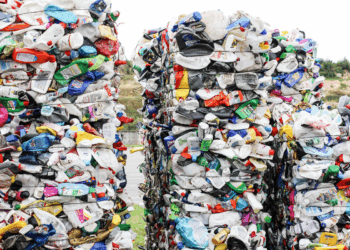New Jersey’s legislature will send the governor a bill requiring post-consumer content in plastic containers and bags as well as glass bottles and paper bags.
S 2515, which received final votes in both the state Assembly and Senate on Jan. 10, places strict requirements that manufacturers use recycled materials in their products. Much of the focus is on plastics.
If signed into law, producers would eventually need 50% post-consumer resin (PCR) in both beverage and non-beverage plastic containers, 40% PCR in carryout bags, and up to 40% PCR in the thickest kinds of trash bags.
The following are recycled-content requirements of the bill:
Plastic packaging and films
A large portion of the bill addresses PCR requirements for plastic containers and film. The following are the mandates:
- Rigid plastic containers (non-beverage): 10% PCR two years after the bill’s effective date. Then, after another three years (and every three years thereafter), the percentage increases by 10 percentage points until reaching 50%.
- Rigid plastic beverage containers: 15% PCR after two years. Then, after another three years (and every three years thereafter), the requirement increases by 5 percentage points until reaching 50% (except for beverages filled using a “hot fill process”; they would be capped at 30% PCR).
- Plastic carryout bags: 20% PCR after two years, and 40% PCR three years later.
- Trash bags: PCR requirements vary by bag thickness. After two years, the following requirements go into effect: 5% for bags between 0.70 mils and 0.80 mils thick, 10% for 0.80 mils to 1.00 mil thick, 20% for bags greater than 1 mil thick. After another three years, each of those percentage requirements will double.
Glass containers and paper bags
The following are the requirements for glass containers and paper carryout bags:
- Glass containers: 35% post-consumer glass after two years; however, if half of the recycled glass consists of mixed-color cullet, then the recycled-content requirement drops to 25%.
- Paper carryout bags: 40% post-consumer fiber after two years; however, bags that hold eight pounds or less would only need 20% post-consumer fiber.
The legislation gives the state’s Department of Environmental Protection (DEP) the power to adjust the targets after considering various factors, including changes in market conditions, recycling rates, availability of recycled materials, recycling infrastructure capacity and progress made by manufacturers.
The bill includes a number of key exemptions. Food packages (except for plastic and glass beverage containers) would be exempt from the recycled-content requirements for five years. The bill also completely exempts packaging for milk and plant-based milk beverages, medical food, food for special dietary use, and infant formulas.
The bill also bans polystyrene loose fill packaging, such as packing peanuts.
Additionally, the legislation requires the state to consult with the Association of New Jersey Recyclers and the New Jersey Clean Communities Program to launch a statewide recycling education campaign.
Initially passed Senate last June
On Jan. 10, the Assembly voted 48-26 (with another three representatives not voting) to approve the bill. The Senate then immediately voted 22-15 in favor of the bill, which had originally passed by the Senate back in June 2021 but had subsequently been amended by the Assembly, which meant it required another Senate vote.
The bill now heads to the desk of New Jersey’s Democratic governor, Phil Murphy.
The Institute of Scrap Recycling Industries (ISRI) released a statement praising the bill’s passage, saying that it “reflects a strong commitment to not only increase the use of recycled content in packaging materials, but to develop a sustainable program with quantifiable metrics and realistic goals.
“This will help increase stakeholder commitment throughout the supply chain to ensure plastics are responsibly manufactured, collected, and recycled into new products,” the statement added.
The Glass Packaging Institute criticized the glass provisions of the bill. In a statement, GPI President Scott DeFife pointed to the lack of a deposit program in New Jersey to drive recovery of glass that can be used in bottles.
“Instead, the bill sets up a costly bureaucratic program that will collect recycled content data from international food and beverage manufacturers who sell products into the state of New Jersey that are packaged in glass,” he said. “A more critical piece of data would be for the MRFs and haulers to disclose where they send their glass and how much of their recycled glass is going to landfill.”
New Jersey is just the latest state to look anew at recycled-content mandates as a way to force demand pull for recycled materials. In recent years, California and Washington state have passed and signed bills imposing their own requirements for plastic packaging (California is among the states that already have recycled-content requirements for glass bottles).
A packaging industry lobbyist previously said the New Jersey bill is more expansive than the West Coast policy efforts, according to Plastics News.























